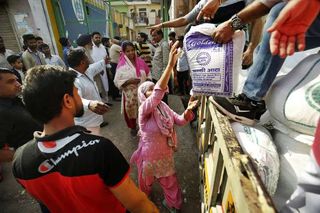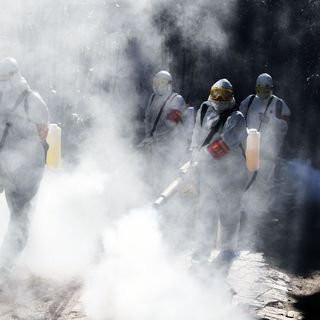
Amid the Covid19 Pandemic, Volunteers Risk Their Health to Rehabilitate Delhi Pogrom Survivors
NGOs are fighting curfew policies to provide on-ground rations to those affected by the February anti-Muslim violence in Delhi.

“A few days before the lockdown I was at the Idgah camp distributing relief material. On my way back home, I began to realize how dirty my hands were. I couldn’t shake off the worry of falling sick. Had I been touching my face? Will I, unknowingly, carry the virus home?”
Gurpreet Wasi, a volunteer with Khalsa Aid – an NGO that is working with 1000-plus families who were victims of the February 23 mass mob attacks in Delhi in the aftermath of the Citizenship Amendment Act (CAA) protests – was helping with relief work at a camp set up for people displaced by the pogrom when the coronavirus pandemic hit India. Soon, Prime Minister Narendra Modi announced a 21-day-lockdown, making providing relief aid difficult. For Wasi, volunteering at this hour posits itself as cognitive dissonance, in which she ricochets between wanting to help those rendered doubly vulnerable by the Delhi pogrom and subsequent pandemic, and needing to take care of her own health.
“With the local clinic doctor testing positive for Covid19, there is a lot of uncertainty and fear among residents and citizen-activists alike,” Wasi adds. Like her, tons of volunteers are finding themselves bargaining with their health in the middle of a global pandemic to provide resources to those impacted by the attacks, which claimed 53 lives, left large parts of Muslim-majority neighborhoods in North East Delhi vandalized, and forced thousands of families to leave their home in fear of their lives. Volunteers have been helping these families by giving them rations, giving the children art therapy and other lessons, and setting up local libraries in the relief camps. Their efforts, however, are rendered difficult because only a handful have permission to provide on-ground relief. Awareness and conversations around helping the pogrom survivors has also been replaced by news of the pandemic and the lockdown. This has increased the burden on the volunteers to provide relief to survivors, due to which they’re increasingly experiencing fatigue and feelings of being overwhelmed.
“We cannot turn away anyone. We are stretched thin, but we need to cater to riot victims, alongside other families in the neighborhood who do not have the wherewithal to stock up [for this nationwide curfew],” Manasi Saxena, a volunteer with NGO Helping Hands, says about HH’s efforts to provide rations to riot-affected communities that have reached more than 700 families so far. Due to the pandemic, however, the number of people in need of basic amenities, such as food and other essentials, is increasing at an alarming rate, spreading already limited resources thinner.
Related on The Swaddle:
The Women Caught Up In the Delhi Violence
The 21-day-lockdown announced due to the cataclysmic spread of coronavirus – a zoonotic flu virus that has wreaked havoc globally – has also led to a shortage of utilities and caused the economy to plummet. “The biggest challenge here is that the economic slowdown is making people wary of supporting charitable causes because they are concerned about their own finances. We are working with the government to coordinate the delivery of cooked meals. But the scale is overwhelming. Kashmere Gate alone has 7000 stranded individuals. The shortage of food, and eventually shelter, is estimated in lakhs. This is a full-blown crisis,” KK Mookhey – another volunteer with HH and the CEO of Network Intelligence, a cybersecurity company – elaborates.
With shops shut and many local services debilitated, hundreds of daily wage workers are also out of jobs. This becomes an additional problem because now, the efforts of the volunteers have increased beyond just helping pogrom victims. The volunteers are now working with the government to help both Delhi pogrom survivors and wage workers get basic ration and even shelter. Some wage workers, for example, were forcefully evicted by landlords and asked to return to their villages, although the Aam Aadmi Party has appealed to the workers not to leave, and is offering compensation and rent. Some workers after having made the long commute without any transport, walking hundreds of kilometers with their children on their backs and their luggage in tow, are even being turned away from their villages. “Reports suggest that, in some of the villages, especially in UP, there is resistance from residents to let migrant workers [based out of cities] in, fearing that they might be carriers of the virus,” explains Bilal Zaidi, co-founder of Our Democracy, a platform that has raised six lakhs via crowdfunding for an ongoing campaign that seeks to provide respite to survivors of the Delhi pogrom. To alleviate the burden on these individual organizations and their volunteers, the Indian government will need to help resettle and arrange for adequate shelter and food for lakhs of its underprivileged citizens.
But until that happens, volunteers, like Wasi, Mookhey, Saxena and Zaidi, are using creative methods to help keep up with the challenge of providing relief, shelter and resources to those who need it, despite the lockdown limiting their presence on the ground. The money from fundraising efforts by citizens like Eshna Kutty, who did a one-day Hoop For Hope workshop and raised more than three lakhs for the riot victims went straight to help the children with textbooks and other educational needs. Inventiveness has become the biggest tool for all volunteers and organizations working in the present scenario. As such, many have turned to locals for help with purchasing and delivering supplies to the pogrom victims. “This is a more scalable model,” Mookhey says, adding that NGO workers have now formed a large network of locals, also comprising social workers, who’re pooling resources to carry forward their efforts consistently.
Speaking about some of the challenges on the ground, Wasi mentions one of procuring curfew passes: “None of the official lines are working. I have applied several times, but I am yet to receive a response.” Other NGOs, like HH, have managed to get a few passes and are managing all deliveries with the help of a handful of volunteers. “They are magic workers,” Saxena says.
Related on The Swaddle:
The Coronavirus Pandemic Holds a Mirror to Our Culture’s Shameless Classism
However, working round the clock begins to take a toll on the volunteers’ mental health, with fatigue setting in, necessitating the need for citizens to step up in whatever way they can. To that end, NGOs have set up avenues for people to donate money or supplies, send groceries to relief camps and volunteers via OTT grocery delivery apps, or contribute to the coronavirus relief fund.
While the scale of the damage caused during the Delhi pogrom is enormous, it is vital for us to do our best. Saxena’s reassertion serves as a veritable reminder: “All our systems are overwhelmed, but we hold each other as much as we can.”
Meghna Prakash is a poet and independent journalist based out of New Delhi. She is the founder of Poetry Dialogue and curates daily poems and art for poetry lovers. She has been a featured artist with Kommune, Unerase Poetry and Airplane Poetry Movement, and other poetry collectives. Her articles and poetry have been published in The Caravan, Scroll, Indian Express, Feminism In India, Midday, Hindustan Times, India Today, Homegrown, Ethos Literary Journal, Why Indian Men Rape, and Kritya.
Related


Is Spraying Disinfectant in Public Spaces an Effective Way to Stop the Spread of Covid19?
